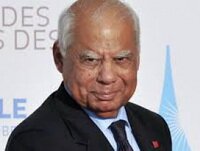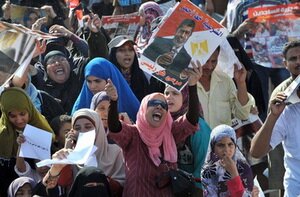
The Independent Analytical Center for Geopolitical Studies “Borysfen Intel” affords ground to the analysts generation for expressing their point of view regarding the political, economic, security, information situation in Ukraine and in the world in general, according to their personal geopolitical studies and analyses.
Note that an authors’ point of view
|
Oleksiy Volovych
The author of the material that we are offering to our readers is a former military serviceman, a graduate of the Faculty of Oriental Languages of the Moscow Military Institute of Foreign Languages. At one time he served as a military translator in Egypt, Iraq, Libya, the UN Forces of peacekeeping in Bosnia and Herzegovina (UNPROFOR).Is engaged in scientific activity, Candidate of Historical Sciences. For some time he worked at the Ukrainian Embassy in Lebanon as Secretary for Political Affairs. Now Oleksiy Volovych is a leading researcher of the Odessa branch of the National Institute for Strategic Studies. He speaks English, Arabic and its dialects.
Egypt: Revolution or a Military Coup? Part 3
“Interim President Adly Mansour”
Late in the evening of July 3, 2013, the military leadership has appointed the Head of the Supreme Constitutional Court Adly Mansour (68 years old) acting President for the transition period. Mohamed ElBaradei was appointed Vice President for International Relations.
|
Note: In 1967 A. Mansour graduated from the Faculty of Law of Cairo University, and took a course at the French National School of Management. He has extensive experience as a judge in the religious as well as civil and criminal courts. Since 1992 he has been a Member of the Supreme Constitutional Court of Egypt, from May 2013 — its Head. |
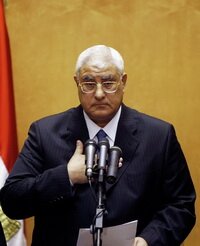 |
|
Adly Mansour, the interim President of Egypt RIA Novosti http://ria.ru/ |
July 4, 2013, having taken the Presidential oath, Adly Mansour made a brief speech, greeting the Army, Judiciary and Police. He also thanked the Egyptian media for “lighting failures of the previous regime” and praised the participation of all the revolutionary forces in the “Glorious Revolution of June 30.”
On the 8th of July A. Mansour signed a new Constitutional Declaration, granting himself legislative power until the election of a new Parliament. Parliamentary and Presidential elections in the country are scheduled for early 2014. According to the Constitutional Declaration, two months after the approval by referendum of amendments to the current Constitution, Parliamentary elections must be held (tentatively in January 2014). Presidential elections are supposed to be held a week after the Parliamentary ones.
July 19, 2013 Adly Mansour urged the population to national reconciliation and dialogue, promising to “restore complete order, prevent chaos and violence in the country, defend the gains of the revolution and continue to move toward freedom and stability”. In this case, obviously meaning Islamists in the first place, he pointed out that “the framework of national reconciliation is open to all political forces without exception”.
July 20 Adly Mansour signed a Decree to establish a Commission to amend the Constitution, which was suspended on July 3 by the Commandment of the Armed Forces of Egypt. The Commission will have to make some changes to the Constitutional articles around which disputes arose prior to its entry into force in December 2012. The amended text of the Constitution will be put to a general referendum, four months after the signing of the Constitutional Declaration (around October-September of this year).
Provisional Government
July 8 as the new Prime Minister of Egypt, the military appointed a prominent economist Hazem el Bablawy (77 years old), who in 2011 held positions of Deputy Prime Minister and Minister of Finance.
Note: Having graduated from Economics Faculty of the University of Cairo, H. el Bablawy continued studying in Grenoble and Paris, where he defended his Doctoral dissertation. In the following years he taught at the universities of Egypt, Sorbonne and California, was an Adviser to the Minister of Finance of Kuwait, Manager of the Export Bank, the Deputy Secretary General of the UN, headed the United Nations' Economic and Social Commission for Western Asia (ESCWA, Beirut). H. el Bablawy is the author of many books on economic issues. |
H. el Bablawy intends to gather in the Cabinet a strong team of professionals and technocrats of 35 Ministers. At several positions will remain Ministers from the previous government, three Ministerial posts are held by women and 3 — by Coptic Christians. There is not a single Islamist among the Ministers. “Freedom and Justice Party” (“Muslim Brotherhood”), “Party of Creativity and Development” (“al-Gama'a al-Islamiyya”) and the party of Egyptian Salafi “An-Nur” refused to enter the new Egyptian government. In the new Cabinet, General al-Sisi was appointed First Deputy Prime Minister, while retaining his position as Head of the Defense Department (which is clearly contrary to previous assurances of the military that they “will not go into power”).
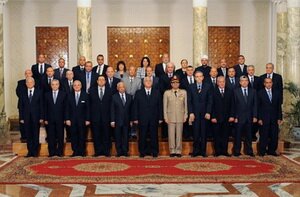 |
|
The interim government of Egypt has taken an oath before the President of the country Adly Mansour Фото AFP http://www.segodnya.ua/ |
July 16 provisional Egyptian government took an oath of allegiance to the Constitution before the interim President of the country Adly Mansour. The ceremony took place at the residence of Egyptian Presidents “El-Ittihadiya” Palace in Cairo. The H. el Bablawy's Cabinet of Ministers-technocrats that had replaced the Hesham Qandil's government of Islamists, has a very difficult task: to take the country out of the severe economic crisis before the Parliamentary and Presidential elections. That is why in the new Cabinet there are many professional and experienced economists.
In general, the core of the new government is made of liberals who had been educated abroad, in particular in the USA. Thus, the new Foreign Minister Nabil Fahmy spent many years as Egypt's ambassador in Washington. Some Ministers held a variety of senior positions in the Administration of Hosni Mubarak, which was disappointing, even to the political forces that supported the military coup.
Speaking on July 20 on Egyptian television, interim Prime Minister H. el Bablawy urged the Egyptian people to reconciliation and unity for the sake of overcoming the difficult stage in the history of the country. H. el Bablawy promised that his interim government will develop a strategy for the country in the current and future periods, and all government decisions will be transparent to the public. According to H. el Bablawy, the primary task of the interim government is to achieve harmony and understanding among the Egyptians. The main criteria in the selection of candidates for Ministerial posts in the government formation were professionalism and reliability. H. el Bablawy found it necessary to point out that he had not had any contact with the Minister of Defense, General al-Sisi over the composition of the government and acted solely on the instructions of the interim President Adly Mansour.
H. el Bablawy informed about the creation of a new “Ministry of Social Justice”, and promised to “restore respect for the Law and independence of the courts in the country, which is the basis of social justice”.
H. el Bablawy drew attention to the fact that Turkey, Iran, Qatar and other countries have expressed their dissatisfaction with the recent events in Egypt. He said that the Egyptian government intended to patiently explain the causes of these events, and to establish a dialogue with these countries. H. el Bablawy acknowledged that the United States put pressure on Cairo, while providing assistance to protect its interests in the Middle East. However, this does not mean that taking U.S. aid, Egypt is obliged to obey Washington completely.
H. el Bablawy noted that Egypt is a Muslim country, but the use of Islam for political purposes is unacceptable. H. el Bablawy also assured that he and his government are ready to publish their proposals for amending the Constitution.
Opposition Continues
 |
| The attack on the Headquarters of the Republican Guard in Cairo ended in a tragedy http://www.ukrinform.ua/ |
After the announcement of the resignation and arrest of President Mahmoud Morsi and leaders of “Muslim Brotherhood”, clashes between demonstrators resumed with renewed vigor. Taking into consideration the heat of summer and the onset of Ramadan (the Muslim month of fasting), bloody clashes of opponents and supporters of the military coup occur mainly at night. On the night of July 6, in the country 38 people were killed, hundreds — injured. On the night of Monday, the 8th of July, when Islamists tried to storm the Headquarters of the Republican Guard in Cairo, where M. Morsi was allegedly restrained, 50 people were killed, and 435 — wounded.
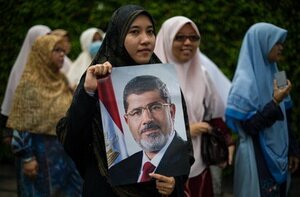 |
|
The Morsi supporters marching through the streets of Cairo Photo: AFP http://www.segodnya.ua/ |
On the night of Saturday, July 13, tens of thousands of Islamists took to the protest march through the streets of Cairo, demanding the release and reinstate the ousted Egyptian President M. Morsi. This demonstration proceeded peacefully, without victims, which, however, is not a sign of curbing political passions and transition to a civilized political struggle. Already on the night of the 16th of July the Egyptian police detained 400 people who took part in the clashes between supporters and opponents of ousted President M. Morsi. Seven people were killed and over two hundred injured.
July 19, after the Friday prayer, demonstration of supporters and opponents of the ousted Egyptian President Mahmoud Morsi renewed. Earlier, the Islamists had declared that Friday July 19 had to become “a turning point in the return of the rule of Law”. Police detained dozens of protesters - members of mass brawl in the walls of the main Egyptian Mosque “Al-Azhar” in Cairo. Rabia al-Adawiya Square remains the main gathering place for supporters of M. Morsi. Liberal political forces that supported the military coup, traditionally gather in Tahrir Square. Mass actions of the two warring parties were also held in many other cities of Egypt.
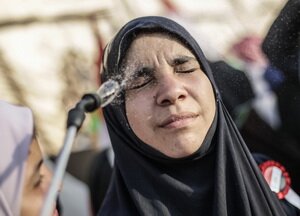 |
|
Participants of the meeting of Morsi's supporters are being sprayed with water to prevent sunstrokes Foto: RIA Novosti http://newsradio.com.ua/ |
On the night of July 27 bloody clashes broke out with new energy between supporters of ex-President Morsi and the Egyptian Army units and Police. According to some reports, during the clashes in Cairo alone, more than a hundred people were killed and nearly a thousand were injured. The military said that soldiers were forced to use their weapons because the proponents of the “Muslim Brotherhood” were trying to capture an arsenal of weapons, situated near Rabia al-Adawiya Mosque. Soldiers and police were shooting to kill.
According to many observers, these clashes were provoked by Egypt's Minister of Defense Abdel Fattah al-Sisi, who addressed the nation on the eve with the request to people to take to the streets on Friday, the 26th of July, to “support the army in its fight against terrorism and unrest”. Besides, another round of violence in Egypt was caused by the charges formally nominated on July 26 against M. Morsi — treason and support for terrorists. On the same day the former President was moved to a suburb of Cairo, where the Tora prison is situated, in which for more than two years, has been the previous Head of Egypt — Hosni Mubarak. The court decided to arrest M. Morsi for 15 days (although before that he had been in custody for three weeks), ignoring the fact that the leaders of some of the great powers, including the United States, had called on the new Egyptian authorities to release M. Morsi.
We must assume that the confrontation and mass protests in Egypt will continue for a long time, at least until the end of the election campaign in early 2014.
The Reaction of the World Community
World leaders have reacted differently to the military coup in Egypt. Some criticized it, others supported, and there are those who benefit from their neutral position. U.S. President Barack Obama has expressed deep concern over the removal from power of President Mahmoud Morsi and suspension of the Constitution of the country, urging the Egyptian military as soon as possible to return full power to a civilian government and not to prosecute M. Morsi and his supporters. The USA promised to suspend military aid to Egypt, if the change of its power is found out to have been a coup. However, in our view, these statements are nothing more than a “compliance of diplomatic etiquette and decorum”. The Americans sent two warships to the coast of Egypt so that in case of an escalation of the conflict, they could quickly evacuate thousands of U.S. citizens working in Egypt.
July 16th Assistant of the US Secretary of State William Burns arrived in Cairo, where he met with the interim President A. Mansour, his deputy Mohammed ElBaradei, the Minister of Defense A. al-Sisi, human rights activists and the Head of the Coptic Church, Pope Towardos II. At this, he did not meet with representatives of the “Muslim Brotherhood” movement. William Burns said that Washington was not going to teach Egyptians how to overcome the economic and political crises, because they have to “determine their own future and their way to democracy”.
UN Secretary-General Ban Ki-moon stated that he was “with growing concern following the events in Egypt”, urging Cairo to take into consideration interests of all political forces in forming the new government. The African Union has suspended the participation of Egypt in the activities of this organization until the restoration of Constitutional order. The League of Arab States unreservedly supported the military coup in Egypt. The Arab League Secretary-General, Egyptian Nabil el-Araby made a trip abroad, urging the international community that in Egypt took place just “another people's revolution”, and not a military coup.
The EU still has no clear official position on the events in Egypt. The Europeans are in constant contact with the Egyptian authorities, trying to take on the role of mediator between the conflicting parties in order to persuade them to dialogue. However, in our view, it is unlikely that there are sufficient grounds for suspecting the entire EU and individual European countries in their sympathies to the Egyptian Islamists, pursuing Egyptian Coptic Christians.
July 17, EU High Representative for Foreign Affairs and Security Policy Catherine Ashton arrived in Cairo to meet with interim President A. Mansour, interim Prime Minister H. el Beblawy, representatives of political parties and civil society, encouraging them to “the early holding of democratic transformations”. According to Ashton, “The European Union will provide assistance to the Egyptian people on its path to real freedom and economic development in future.”
Germany's Foreign Minister Guido Westerwelle called the events in Egypt a serious precedent that could be dangerous for democracy in Egypt and creating negative consequences for the entire Middle East region. Ankara and Tehran firmly condemned the military coup in Egypt, while Saudi Arabia, the UAE and Kuwait supported it by providing M. Morsi with previously promised 12 billion US dollars.
 |
|
Yusuf al-Qaradawi, a Muslim theologian from Qatar, the spiritual leader of the "Muslim Brotherhood" http://martinis09.livejournal.com/ |
Removal from power of M. Morsi was a painful blow to the foreign policy of Qatar, the main focus of which was to support the “Muslim Brotherhood” in the Arab world since the beginning of the series of “Arab revolutions”. Qatar was the main sponsor of M. Morsi, having given more than 8 billion US dollars to support him. Several decades in Qatar have been living the spiritual leader of the “Muslim Brotherhood” Yusuf al-Qaradawi, instructing his “brothers” through the channel “Al Jazeera”.
Syrian President B. Assad, for two and a half years having been warring with Islamists, called the events in Egypt the beginning of the end of “political Islam”. Coincidence of the positions of Damascus and Tel Aviv looks strange, they both applaud to the Egyptian military coup, while Iran — a strategic partner of Syria — condemns it. Stranger still, in our opinion, was the statement of the Israeli Ambassador to Egypt, Yaakov Amitai that “General al-Sisi is not only a national hero of Egypt, but also a hero of all the Jews in Israel and around the world”. Taking into consideration that 95% of Egyptians traditionally see Israel as their historical enemy, such a compliment sounds very dubious and unlikely to contribute to the popularity of General al-Sisi among Egyptians.
Russia stands for solving problems and contradictions in Egypt without violence, with the principles of national consent and in the interests of all strata and religions of the Egyptian society. Ukraine has a similar “streamlined” position in relation to the events in Egypt.
* * *
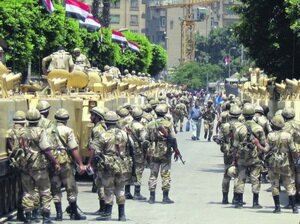 |
| The Cairo Egyptian Museum. At the entrance to the museum you can see many soldiers and two columns of armored vehicles Photo: А. Manchuk http://www.segodnya.ua/ |
The Commandment of the Egyptian Army, though trying to position itself as an arbitrator, keeping a neutral position between the opposing sides, yet it is on the side of the secular opposition and seeks to limit the power and influence of Islamists. However, to completely exclude Islamist parties from the political life of the Egyptian will not succeed. If they are unable to act legally, the alternative to this can only be the underground resistance with elements of terror, which will cause permanent instability in Egypt. On the other hand, exhausting the society and authorities long-lasting many-thousand peaceful demonstrations of protest and defiance may be more effective than military actions.
Comparing the recent level of the Egyptian economy and society with their current state indicates that at the end of President Hosni Mubarak (who is now facing the death penalty), this level despite the many shortcomings and flaws, was much higher. This suggests that not every revolution guarantee progress in the development of society. It seems that in this case the Egyptian revolution February 11, 2011 discards the Egyptian society for many years. Obviously, the same goes for “revolution” in 2011 in Tunisia, Libya and Syria.
The arrest of the legitimately elected former president M. Morsi and even his trial, despite his rather modest qualities, as of a political leader, will inevitably end in his glorification, formation of his so far absent charisma. Every political party needs a leader, a symbol, and such a heroic symbol for the “Muslim Brotherhood” and their supporters will be M. Morsi.
The assets of the “Muslim Brotherhood” movement is the 80-year old history of the underground struggle, and it will never give up its historic conquest — a democratic election of its representative for President of Egypt.
Therefore, in our opinion, any attempt to remove the “Muslim Brotherhood” from the Egyptian political arena, are doomed, because they will continue to be supported by at least 30% of the Egyptian population. The soil that feeds a “revolution” in Egypt is the presence of 20-30 million of the poorest citizens. They have nothing to lose, and in desperation they are ready for everything, including support for the “Muslim Brotherhood”. Any Egyptian authorities have to reckon with this. Attempts to ban a legal political activity of “Muslim Brotherhood” would entail very negative consequences, of course, first of all — for the initiators of such a ban.
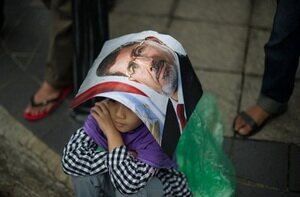 |
| The Egyptians made the overthrow of Morsi Photo: AFP http://www.segodnya.ua/ |
The most dangerous consequence “of the Egyptian revolt” is a split, and polarization of the society. The main cause of this destructive phenomenon is a division of the citizens of the country, especially in the last year, according to their religion, or rather, the degree of religious fanaticism. Instead of religious tolerance in the thinking and behavior of people had been inculcated rigid and monotonous unanimity. Anyone who dared to express a different from the course of “the party and the government” opinion, was declared a dissident and a traitor. Obviously, a lot of time must pass before the existing division of the Egyptian society is minimized.
Currently, there are many kinds of forecasts on further development of the political situation in Egypt. In our view, the presence of a variety of factors, internal and external, objective and subjective, influencing the formation of this situation, complicates the forecasting process. Nevertheless, we believe that the political situation in Egypt will develop in the following scenario:
Taking into consideration that during most of the twentieth century, in Egypt dominated secular form of government and secularism has deep enough roots in different strata of the Egyptian society, in our opinion, in the future it will be developing mainly in accordance with generally accepted in the world democratic principles. But, of course, interspersed with elements of Eastern (Muslim) democracy and of so-called “Arab socialism”.
“Muslim Brotherhood”'s return to power democratically is unlikely. And not because they “won't be let” by the Egyptian military. They apparently will not be able to get the required majority of Egyptian citizens, as the latter are completely disappointed in the “Brotherhood”. If on the peak of his popularity their representative M. Morsi received a quarter of the votes in the Presidential election, it is unlikely to achieve this in six months again.
Especially, even less likely is coming to power of other less popular Islamist groups — the Wahhabi Salafi party of “An-Nur” and the group “al-Gama'a al-Islamiyya”. Islamists' coming to power in Egypt by force (armed) way is simply unthinkable. This would not allow Egyptian Security Forces, especially the Army and Police, whose transition to the side of the Islamists is also unlikely.
In our view, the events in Egypt — or rather, the outcome of the confrontation between Islamists and secular political forces, will have momentous consequences, not only for this country but for the entire Middle East. Possible defeat of Islamists in Egypt will inevitably lead to a weakening of the Islamist parties in the Middle East region and especially in Turkey, Libya and Tunisia. And vice versa — maintaining strong positions of the Islamists in Egypt and their impact on Egyptian society would strengthen political Islam in the region. However, the “clear victory” either of the former or of the latter is impossible. Therefore, in the situation of balance of forces or their weakness, Egyptian secularists and Islamists will be forced to seek forms of coexistence and even situational interaction.


